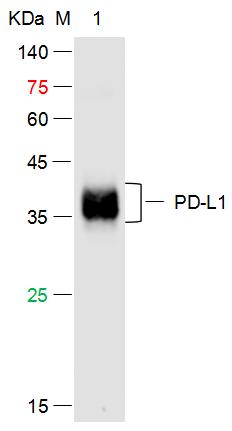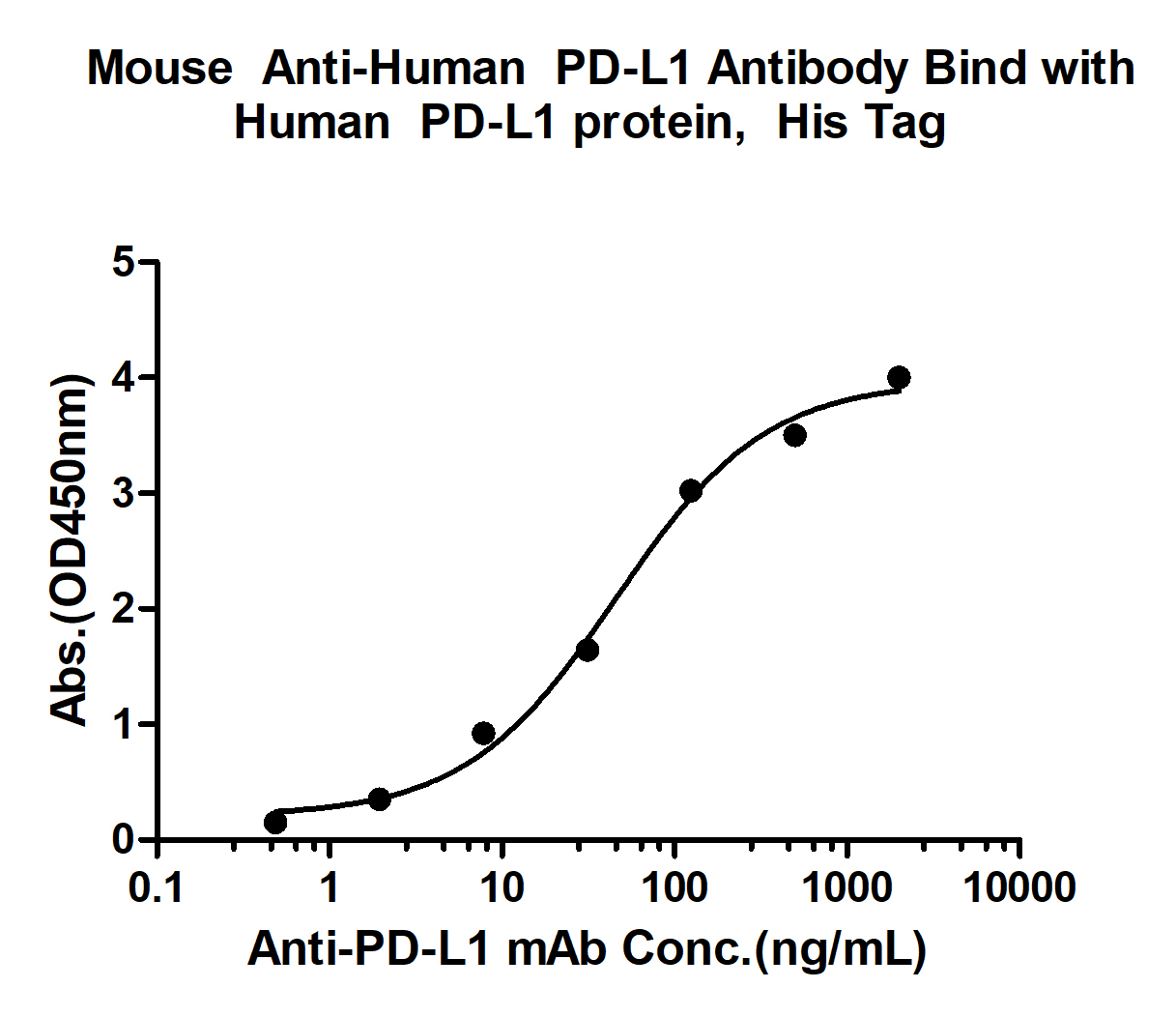
Mouse Anti-PD-L1 antibody
Programmed cell death 1 ligand 1; CD274; B7 H; B7 H1; B7 homolog 1; B7-H1; B7H; B7H1; CD 274; CD274 antigen; CD274 molecule; MGC142294; MGC142296; OTTHUMP00000021029; PD L1; PD1L1_HUMAN; PD1L1_Mouse; PDCD1 ligand 1; PDCD1L1; PDCD1LG1; PDL 1; PDL1; Program
View History [Clear]
Details
Product Name PD-L1 Chinese Name 人程序性死亡配体1单克隆抗体 Alias Programmed cell death 1 ligand 1; CD274; B7 H; B7 H1; B7 homolog 1; B7-H1; B7H; B7H1; CD 274; CD274 antigen; CD274 molecule; MGC142294; MGC142296; OTTHUMP00000021029; PD L1; PD1L1_HUMAN; PD1L1_Mouse; PDCD1 ligand 1; PDCD1L1; PDCD1LG1; PDL 1; PDL1; Programmed death ligand 1; RGD1566211. Research Area Tumour Cell biology Signal transduction Apoptosis Immunogen Species Mouse Clonality Monoclonal Clone NO. 3F5 React Species Human, Applications WB=1:500-2000 ELISA=1:5000-10000
not yet tested in other applications.
optimal dilutions/concentrations should be determined by the end user.Theoretical molecular weight 29kDa Cellular localization The cell membrane Form Liquid Concentration 1mg/ml immunogen Recombinant Human PD-L1 Protein: 19-238/290 Lsotype IgG2b Purification affinity purified by Protein A Buffer Solution 0.01M PBS(pH7.4) Storage Shipped at 4℃. Store at -20 °C for one year. Avoid repeated freeze/thaw cycles. Attention This product as supplied is intended for research use only, not for use in human, therapeutic or diagnostic applications. PubMed PubMed Product Detail This gene encodes an immune inhibitory receptor ligand that is expressed by hematopoietic and non-hematopoietic cells, such as T cells and B cells and various types of tumor cells. The encoded protein is a type I transmembrane protein that has immunoglobulin V-like and C-like domains. Interaction of this ligand with its receptor inhibits T-cell activation and cytokine production. During infection or inflammation of normal tissue, this interaction is important for preventing autoimmunity by maintaining homeostasis of the immune response. In tumor microenvironments, this interaction provides an immune escape for tumor cells through cytotoxic T-cell inactivation. Expression of this gene in tumor cells is considered to be prognostic in many types of human malignancies, including colon cancer and renal cell carcinoma. Alternative splicing results in multiple transcript variants. [provided by RefSeq, Sep 2015]
Subunit:
Interacts with PDCD1.
Subcellular Location:
Isoform 1: Cell membrane; Single-pass type I membrane protein. Isoform 2: Endomembrane system; Single-pass type I membrane protein.
Tissue Specificity:
Highly expressed in the heart, skeletal muscle, placenta and lung. Weakly expressed in the thymus, spleen, kidney and liver. Expressed on activated T- and B-cells, dendritic cells, keratinocytes and monocytes.
Similarity:
Belongs to the immunoglobulin superfamily. BTN/MOG family.
Contains 1 Ig-like C2-type (immunoglobulin-like) domain.
Contains 1 Ig-like V-type (immunoglobulin-like) domain.
SWISS:
Q9NZQ7
Gene ID:
29126
Database links:Entrez Gene: 29126 Human
Entrez Gene: 60533 Mouse
Omim: 605402 Human
SwissProt: Q9NZQ7 Human
SwissProt: Q9EP73 Mouse
Unigene: 521989 Human
Unigene: 245363 Mouse
Product Picture
Lane 1: Human PD-L1 Protein at 100ng
Primary: Mouse Anti-Human PD-L1 Protein Antibody at 1/1000 dilution
Secondary: IRDye800CW Goat Anti-Mouse IgG at 1/20000 dilution
Predicted band size: 29kD
Observed band size: 35-40kD
References (0)
No References
Bought notes(bought amounts latest0)
No one bought this product
User Comment(Total0User Comment Num)
- No comment




 +86 571 56623320
+86 571 56623320
 +86 18668110335
+86 18668110335

